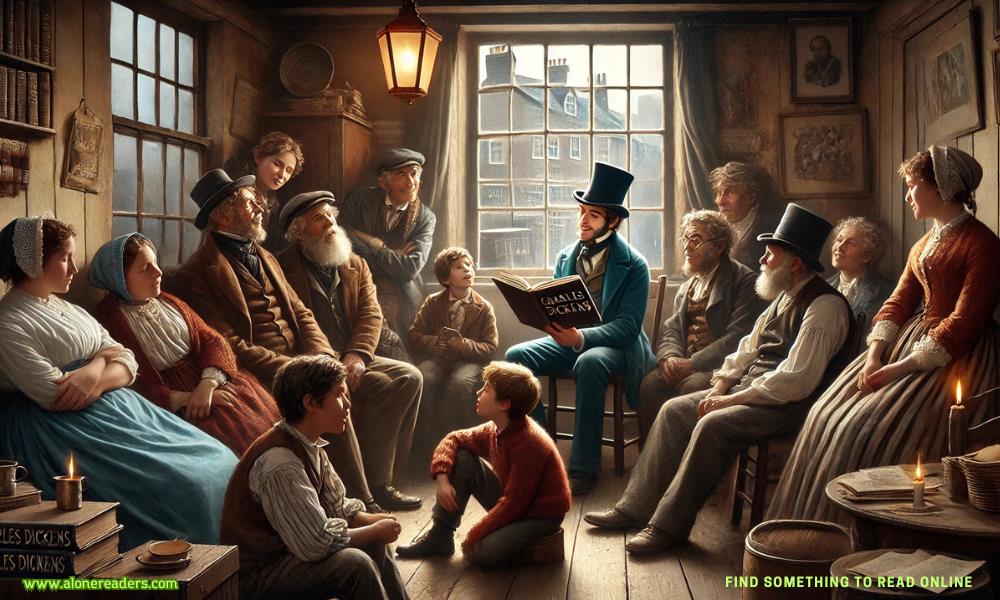
Charles Dickens is widely regarded as one of the greatest novelists of the Victorian era, celebrated for his vivid storytelling, unforgettable characters, and sharp social commentary. While his works are staples of literary study today, their impact during his own time was extraordinary. Dickens’s novels transcended social and economic boundaries, reaching not only the educated elite but also the illiterate poor, who found innovative ways to access his stories despite their inability to read.
In the 19th century, literacy rates were much lower than they are today, particularly among the working-class poor. Books were considered a luxury, and many in the lower classes lacked both the education and financial means to enjoy them. Yet Dickens’s stories resonated deeply with people from all walks of life. His serialized novels, which were published in affordable installments, became a cultural phenomenon. These serialized publications were more accessible than full-length books, and their cliffhanger endings left readers eagerly anticipating the next installment. For those who couldn’t read, the solution was simple yet profoundly communal: they pooled their resources to hire someone who could read aloud.
In the crowded tenements, factories, and streets of Victorian England, groups of people would gather to listen as a hired reader brought Dickens’s words to life. This practice turned the reading of his novels into a shared experience, fostering a sense of community among listeners. Dickens’s rich descriptions, dynamic characters, and gripping plots made his stories ideal for oral storytelling. His works were not merely read; they were performed, with the reader often adopting different voices and intonations for each character. This added drama and emotion, drawing listeners into the narrative and making the experience deeply engaging.
One of the reasons Dickens’s stories resonated so strongly with the working poor was his focus on the struggles and injustices of everyday life. Novels like Oliver Twist and Hard Times depicted the harsh realities of poverty, child labor, and social inequality, issues that were all too familiar to his audience. Through his writing, Dickens gave a voice to the voiceless, offering not just entertainment but also validation and empathy for their experiences. His ability to weave humor and hope into these stories provided an emotional outlet and a sense of resilience, even in the face of adversity.
The communal nature of these readings also highlights the role of storytelling as a form of escapism and empowerment. For many in Dickens’s audience, listening to his novels was a rare opportunity to step away from the drudgery of daily life and immerse themselves in a world of adventure, intrigue, and drama. Characters like the lovable yet downtrodden Pip from Great Expectations or the fiercely determined Nancy from Oliver Twist felt real and relatable, offering listeners the chance to dream and hope for better circumstances.
Dickens himself was deeply aware of the impact of his writing on audiences of all classes. He was known for his public readings, which drew large crowds and showcased his theatrical flair. These performances were immensely popular, further solidifying his reputation as a storyteller who could captivate an audience through the spoken word. Dickens’s ability to connect with his listeners, both in person and through hired readers, speaks to the universal appeal of his stories and his talent for crafting narratives that transcended barriers of class and literacy.
The phenomenon of shared readings of Dickens’s novels also underscores the importance of storytelling as a communal act. In an era before radio, television, or the internet, the act of gathering to listen to a story was a powerful way to forge connections and share experiences. These gatherings became a space for laughter, tears, and reflection, as Dickens’s stories opened a window into worlds both familiar and fantastical. They brought people together in a way that few other forms of entertainment could, creating a collective bond rooted in the power of words.
While much has changed since Dickens’s time, the spirit of communal storytelling remains alive. Book clubs, podcasts, and audiobooks continue to bring people together to share in the magic of stories. Dickens’s legacy endures, not just in the pages of his novels but also in the way his works have inspired generations to connect through the art of storytelling. His ability to unite audiences, regardless of their background or literacy level, is a testament to the enduring power of great literature.
In reflecting on how the illiterate poor embraced Dickens’s works, we see a remarkable example of human ingenuity and the deep need for connection and meaning. Despite the challenges of poverty and illiteracy, these individuals found a way to access and share the stories that moved them. Their resourcefulness and collective effort ensured that Dickens’s words reached far beyond the confines of the written page, transforming them into a living, breathing experience. It is a testament to the timeless and universal appeal of his novels, which continue to inspire and captivate audiences to this day.